Sergei Lavrov in Latin America
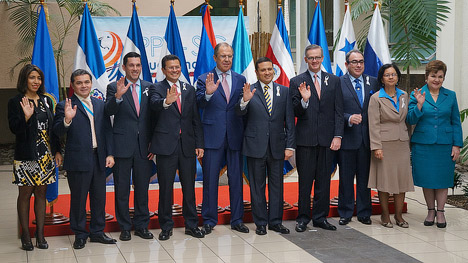
Lavrov’s visit to Havana was regarded as a show of solidarity: Raúl Castro’s government is engaged in complex negotiations with Washington on normalising relations after a 50-year trade and economic blockade. As for the US, it cannot do without trying to put on the pressure and putting forward impossible demands. Lavrov has declared that Russia is in favour of normalising relations between Cuba and the US: «We welcome the process and at the same time call for the illegal trade and financial blockade of Cuba to stop as soon as possible..». Raúl Castro, President of the Council of State of Cuba, thanked Sergei Lavrov and, in return, confirmed that Cuba will support Russia in the future should the US continue to blackmail her with unilateral sanctions.
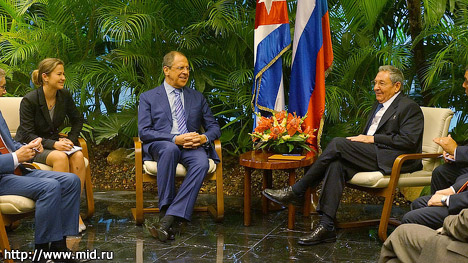
The media in Cuba described Lavrov’s conversation with Raúl Castro and Cuba’s Minister of Foreign Affairs Bruno Rodríguez as a fraternal dialogue. Sergei Lavrov viewed the talks in the same vein: «Particular attention was devoted to discussing the entire range of our relations, especially considering that May 8 is the 55th anniversary of the restoration of diplomatic relations between our countries. The goals that we are facing today were formulated during Russian President Vladimir Putin’s visit to Cuba in July 2014». Russia and Cuba also reiterated their solidarity with the people of Venezuela and its government: «We consider unacceptable any attempts to interfere in the internal affairs of this sovereign state, the illegal sanctions unilaterally imposed by the United States against a number of Venezuelan citizens, and any attempts to organise a coup d’état».
The issue of holding the 13th meeting of the Intergovernmental Russian-Cuban Commission on Trade, Economic, Scientific and Technical Cooperation was also discussed in Havana. By 22 April, both countries’ agencies will have prepared wide-ranging projects in the energy sector and non-ferrous metals industry, as well as with regard to transport and civil infrastructure and civil aviation, biotechnology, healthcare, and pharmaceuticals. There are also signs that Russia will shortly begin building a power plant in Cuba.
The subject of Cuba also featured in Lavrov’s talks with Colombian President Juan Manuel and the Republic’s Minister of Foreign Affairs, María Ángela Holguín. Both sides declared that Moscow and Bogota are in favour of the speedy lifting of the trade and economic blockade against Cuba. US attempts to put pressure on Venezuela with sanctions were again referred to as unacceptable. Venezuelans must resolve their problems themselves, without intervention from outside. Lavrov expressed bewilderment as to why Washington, which is taking steps to normalise relations with Cuba, is also creating a conflict situation with regard to Venezuela through its foreign policy.
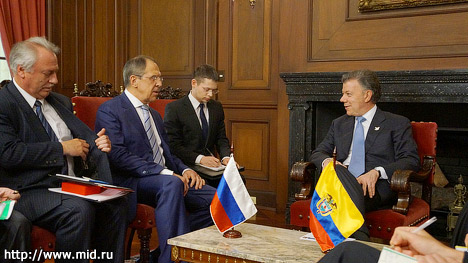
Bogota noted that political relations between Colombia and Russia had been noticeably stepped up following last year’s meeting between Putin and Santos at the BRICS summit in Brazil. Despite Colombia’s traditional orientation towards the US, Santos’ government has not joined in the sanctions against Russia. Bogota often supports Russian initiatives, and it is enough to mention the draft resolutions on information security, as well as on preventing the militarisation of outer space and the glorification of Nazism. Colombia also co-sponsored the UN General Assembly resolution on the 70th anniversary of the end of the Second World War. Bogota has shown a particular interest in establishing contacts with the Eurasian Economic Union. Colombian officials also informed Russia’s foreign minister about positive developments in talks with FARC and ELN representatives (partisan groups in Colombia) and the possibility of ending the years-long armed conflict in the country.
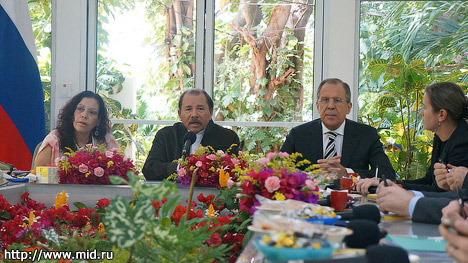
Lavrov’s visit to Nicaragua also proved fruitful. The Russian minister was received by President Daniel Ortega, who confirmed his willingness to develop relations with Russia in the fields of agriculture, transport, engineering, satellite navigation, and pharmaceuticals, while Lavrov praised the progress achieved by Nicaragua thanks to the efforts of the Sandinista government. A good social and economic situation in the country opens up even more opportunities to implement major bilateral and multilateral projects. An example of effective collaboration is the regional drug law enforcement training centre, which has been in operation in Nicaragua since 2012, where law enforcement officers from every Central American country can improve their skills. Not all agreements reached during Lavrov’s meeting in Managua were made public, of course. In particular, an area of military cooperation between the two countries that is extremely important to Nicaragua is the construction of an interoceanic canal, which needs to be reliably protected from possible land, sea and air attacks.
In Guatemala, Lavrov, Guatemalan President Otto Perez, and Foreign Affairs Minister Carlos Morales discussed the possibility of expanding trade, strengthening ties in the fight against drug trafficking, and cooperating in emergency prevention and emergency relief efforts. Lavrov attended a SICA meeting and addressed its General Secretary with an official request from Russia to join the organisation as an extra-regional observer. Carlos Morales stated that Russia’s request would be reviewed as soon as possible.
The Guatemalan section of Lavrov’s tour was also relatively busy. He held talks with colleagues from Argentina, Honduras and Salvador, in which the primary focus was on the possibility of developing a political dialogue between Russia and the countries of Latin America, and the discussion of a schedule of visits for Latin American government officials to Moscow. A visit to Russia by Argentine President Cristina Fernández de Kirchner in the next few months is highly probable.
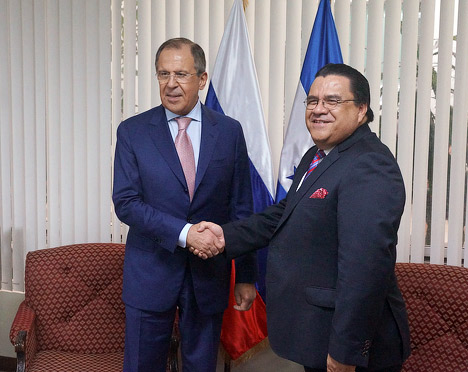
While talking about cooperation with Russia, Arturo Corrales, the Honduran Minister of Foreign Affairs, noted that his country was expecting fruitful work on issues of security. »We already have a relevant agreement,» he said. «Russia is helping us to combat drug crime, money laundering and terrorism. We believe such cooperation is not only favourable, but necessary». Corrales also noted that Honduras was open to cooperation with Russia in any area: from trade to receiving Russian ships at its ports. The minister stressed that Honduras is offering investors the most favourable conditions in the Western Hemisphere. He also stated that an agreement between Honduras and Russia on visa-free travel for its citizens will come into effect in the near future: «It has been ratified and the president (Juan Orlando Hernández) has signed the document».
Three to four years ago, Washington generally tried to hold back its emotions regarding Russia’s growing presence in Latin America and the Caribbean. White House briefings maintained that Russian activity to the south of the Rio Grande, from Mexico to Chile, was not worth taking seriously, that Russia allegedly had no real chance of returning to the region.
But all of a sudden there are cracks. Congress, the White House, the Pentagon and the CIA have become anxious, publicly declaring that Russia is intentionally restoring its influence in Latin America using cold war tactics. These were the conclusions given to the US Senate Armed Services Committee by Lieutenant General Kenneth Tovo, the military commander of the United States Southern Command, who believes that «Russia is trying to deprive the US of its influence in the region». Alluding to publicly-available sources, the general declared: «Russia has courted Cuba, Venezuela, and Nicaragua to gain access to air bases and ports for resupply of Russian naval assets and strategic bombers operating in the Western Hemisphere. Russian media also announced Russia would begin sending long-range strategic bombers to patrol the Caribbean Sea and Gulf of Mexico, in an effort to monitor foreign powers’ military activities and maritime communications».
The general complained that Southern Command is facing insufficient funding and material support «to keep the pilot light of US military engagement on in the [Latin American] region». And that is with approximately 40 military bases in the Western Hemisphere, the full deployment of which would take just 3-4 days! Tovo also maintained that America’s Latin American allies are concerned about the limited nature of US national security programmes and the poor regard for the threat of «transnational organised crime», which, according to the general’s informal and veiled assessment, could have something to do with Russia. The general believes it is time to stop underestimating the Russian threat. Judging from his words, it seems that the spirit of the cold war is once again floating through Washington’s corridors of power. The stereotypes of US imperial policy remain unchanged.
In summing up the Russian minister’s trip to four Latin American countries, experts were more or less unanimous in their opinion that it was a gesture of good will, an invitation for a broad and constructive cooperation. The visit has also enabled many of the propaganda claims about Russia’s role in events in Ukraine to be destroyed. In their final assessment of Sergei Lavrov’s visit, the Latin American media were generally positive: «He reminded the politicians and people of Latin America who their real ally is».